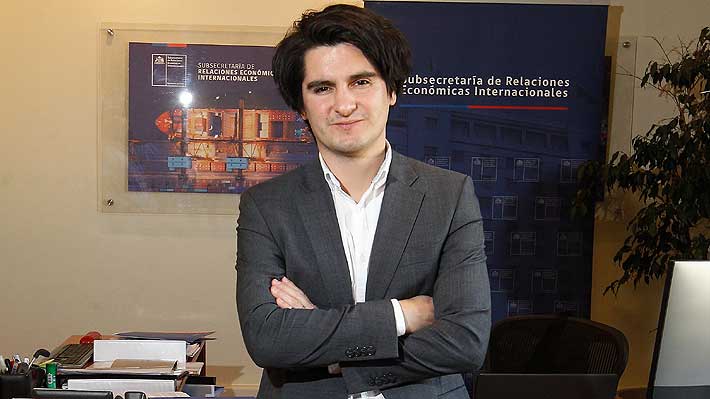The persistent attacks by the right wing and those in power against the Undersecretary of International Economic Relations (Serei) are signs of desperation. They are hurt that José Miguel Ahumada, in his outstanding academic work, has criticised the limits set by the Free Trade Agreements (FTAs) to promote industrial policies. They are also upset that he has met with the organisation “Chile Mejor sin TLC” (Better Chile without FTA) to get their views on the TPP11. And, finally, they add a lie: they hold him responsible for the postponement of the closure of the “modernisation of the agreement with the European Union”.
The right wing, the “yellows”* that follow it and some business associations are out of control. They despair at the end of the subsidiary state, contained in the new constitution and in the transformation initiatives proposed by President Boric. This does not only mean that their business in health, education, water and welfare will end, but also because it opens the way for a productive model that aims to diversify the economy, which will reduce the rentier profits in the exploitation and export of natural resources. This annoys the elite and at the same time prevents them from understanding that a diverse economy can generate interesting opportunities for more enlightened entrepreneurs.
The elite concentrates its blows on the Foreign Ministry, and in particular against Ahumada, because it seems to them to be a weak flank, since both the right-wing and Concertación governments coincided in promoting an indiscriminate economic opening to the world. And in this the proliferation of FTAs has been very prominent.
Indeed, the international economic relations policy of recent decades has been functional to the prevailing neoliberal logic. The subsidiary state, subordinated to the markets, had no interest in orienting the economy in favour of certain industrial activities. As a result, extractivist and financial rentierism was imposed both in the domestic economy and in international economic relations policy.
The indiscriminate opening up to the world eliminated all protection for goods, services, investment and financial capital flows. This was done first unilaterally and then through FTAs. Certainly, new markets were opened to trade in goods, but the doors were closed to the indispensable productive diversification required for development.
The country and the world have changed. The free play of market forces has given way today to protectionism and globalisation in the international economy is not the same as it was yesterday. On the other hand, big business, its economists and politicians who support it, find it difficult to understand that the current government is not one of continuity, but precisely of transformations, not only social but also productive.
Indeed, the current government has proposed going beyond the extraction and export of natural resources to diversify our economy. This is a programmatic commitment to the citizenry, which is also fundamental to generate sources of work that will put an end to the unbearable informality that roams the streets of our country. More and better jobs, recovering productivity and growth are the purposes of productive transformation.
Both protectionism in the world and the current government’s intention to diversify the economy require a new approach to international economic relations policy. It is not a question of putting an end to economic openness to the world, which is unavoidable for a small country like Chile. It is, however, a question of ensuring that trade agreements are functional to the productive changes that have been committed to.
Consequently, the criticisms to Ahumada are actually aimed at questioning productive transformations that go beyond the extraction of natural resources. The importance of promoting Green Hydrogen and adding value to lithium, copper and other natural resources, which is also a programmatic commitment to citizens, is ignored.
Therefore, revising the FTAs, without renouncing them, is no big deal. Revising them means strengthening them, given the new realities of globalisation and the transformative proposal of the new government. This is what will open the doors for foreign and domestic investment to move from the exploitation of raw materials to new productive activities, which should include technology transfers and creative understandings with national capital. If this is achieved, it does not seem an impossible dream to move towards a new production model and a new export basket. This is what will open up new business opportunities, improve productivity and restore growth for our economy.
On the other hand, a good government must listen, and not only to the unions but to society as a whole. Just as Undersecretary Ahumada has met with various business associations, it is also incumbent upon him to hear the opinions of various civil society organisations, including “Chile, better without FTA”. The way for a good government to reconcile different visions and interests, overcome tensions and achieve the balance required by any democratic society is for everyone to give their opinion and open up a thousand flowers.
Finally, it is worth pointing out that the postponement of the modernisation agreement with the European Union (EU) was precisely the responsibility of the French government, because the FTA with Chile was the subject of Macron’s electoral controversy with the far-right nationalist candidate, Marine Le Pen. The talks have resumed and, in the midst of normal negotiations, with minor issues still pending, an early conclusion is expected, as highlighted by Foreign Minister Antonia Urrejola.
In the end, the attacks on Ahumada are one more component of the actions of the right wing, big business and their new friends, dyed in yellow, to prevent the end of the subsidiary state and the neoliberal model.
*Note of Pressenza: the “yellows” (“amarillos”) are a group of civilians, mainly from the intelectual elites, who have expressed their preference for the Rechazo (Reject) option in the upcoming referendum (Sept. 4) to the new Constitution proposed this month by the 154 democratically elected delegates of the Constitutional Convention. Most progressive social and political groups are currently campaigning for the Apruebo (Accept) vote.






